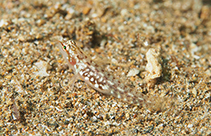| Family: |
Gobiidae (Gobies), subfamily: Gobiinae |
| Max. size: |
2.5 cm SL (male/unsexed) |
| Environment: |
reef-associated; marine |
| Distribution: |
Indo-Pacific: Japan, Micronesia (Palau and Yap), Hong Kong, northern Vietnam, Philippines, Indonesia (Java and Kalimantan to West Papua), and Western Australia. |
| Diagnosis: |
Dorsal spines (total): 7-8; Dorsal soft rays (total): 8-9; Anal spines: 1-1; Anal soft rays: 7-7. Characterized by semi-translucent greyish body with internal stripe of alternating white and reddish brown; large brownish patch on lower side just posterior to pectoral fin base punctuated with large irregular white spots; from nape, along dorsal fin base, to dorsal surface of caudal peduncle with 14 brown spots/saddles; above anal fin base with 6-7 similar brown and white marks; first four dorsal spines of male and first two spines of female often elongate and filamentous; all pectoral rays unbranched; longitudinal scale series 22-23; ctenoid scales except on head, nape, breast and pectoral fin base; separated pelvic fins, bases joined by thin membrane; fourth pelvic ray with 2-8 branches; depth of body 4.0-4.5 in SL (Ref. 90102). |
| Biology: |
Inhabits shallow inshore algal reefs (Ref. 48637). |
| IUCN Red List Status: |
Least Concern (LC); Date assessed: 14 August 2023 Ref. (130435)
|
| Threat to humans: |
harmless |
Source and more info: www.fishbase.org. For personal, classroom, and other internal use only. Not for publication.
